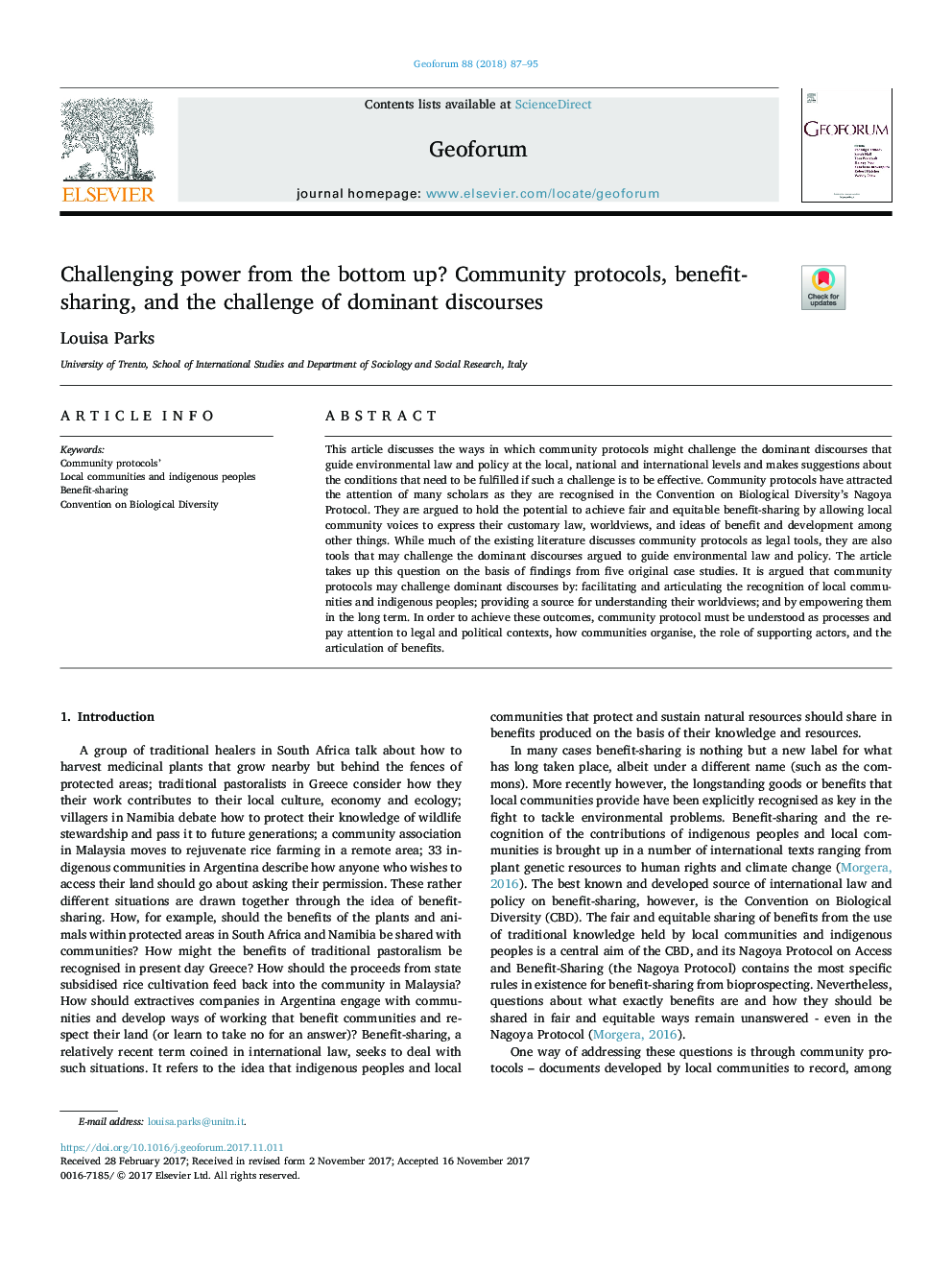| کد مقاله | کد نشریه | سال انتشار | مقاله انگلیسی | نسخه تمام متن |
|---|---|---|---|---|
| 7353889 | 1477101 | 2018 | 9 صفحه PDF | دانلود رایگان |
عنوان انگلیسی مقاله ISI
Challenging power from the bottom up? Community protocols, benefit-sharing, and the challenge of dominant discourses
ترجمه فارسی عنوان
چالش قدرت از پایین به بالا؟ پروتکل های جامعه، به اشتراک گذاری سود و چالش گفتمان غالب
دانلود مقاله + سفارش ترجمه
دانلود مقاله ISI انگلیسی
رایگان برای ایرانیان
کلمات کلیدی
ترجمه چکیده
این مقاله در مورد راه هایی که در آن پروتکل های جامعه می توانند به گفتمان حاکم بر قانون و سیاست های زیست محیطی در سطح محلی، ملی و بین المللی بپردازند و پیشنهادات مربوط به شرایطی را که باید در صورت بروز چنین چالشی موثر باشد، مورد بحث قرار می دهد. پروتکل های محلی توجه بسیاری از محققان را جلب کرده اند، همانطور که در کنوانسیون پروتکل ناگویا تنوع زیستی شناخته شده اند. آنها استدلال می کنند که از طریق اجازه دادن به صدای مردم محلی برای بیان قوانین عرفی، جهان بینی و ایده های سود و توسعه در میان دیگران، امکان دستیابی به منافع عادلانه و عادلانه به دست می آورند. در حالی که بسیاری از ادبیات موجود در مورد پروتکل های اجتماعی به عنوان ابزار قانونی بحث می کنند، این ابزار همچنین ابزارهایی است که می تواند به بحث های غالب در زمینه اداره قوانین و سیاست های زیست محیطی منجر شود. این مقاله بر اساس یافته های پنج مطالعات موردی اصلی، این سوال را مطرح می کند. استدلال می شود که پروتکل های اجتماعی می توانند گفتمان غالب را با چالش کشیدن و تشریح تشخیص جوامع محلی و مردم بومی رقابت کنند؛ ارائه منبع برای درک دیدگاه هایشان؛ و با قدرت دادن به آنها در بلند مدت. به منظور دستیابی به این نتایج، پروتکل جامعه باید به عنوان فرآیندهای شناخته شده و توجه به شرایط قانونی و سیاسی، نحوه تشکیل جوامع، نقش بازیگران حمایتی و تفسیر مزایا توجه شود.
موضوعات مرتبط
علوم انسانی و اجتماعی
اقتصاد، اقتصادسنجی و امور مالی
اقتصاد و اقتصادسنجی
چکیده انگلیسی
This article discusses the ways in which community protocols might challenge the dominant discourses that guide environmental law and policy at the local, national and international levels and makes suggestions about the conditions that need to be fulfilled if such a challenge is to be effective. Community protocols have attracted the attention of many scholars as they are recognised in the Convention on Biological Diversity's Nagoya Protocol. They are argued to hold the potential to achieve fair and equitable benefit-sharing by allowing local community voices to express their customary law, worldviews, and ideas of benefit and development among other things. While much of the existing literature discusses community protocols as legal tools, they are also tools that may challenge the dominant discourses argued to guide environmental law and policy. The article takes up this question on the basis of findings from five original case studies. It is argued that community protocols may challenge dominant discourses by: facilitating and articulating the recognition of local communities and indigenous peoples; providing a source for understanding their worldviews; and by empowering them in the long term. In order to achieve these outcomes, community protocol must be understood as processes and pay attention to legal and political contexts, how communities organise, the role of supporting actors, and the articulation of benefits.
ناشر
Database: Elsevier - ScienceDirect (ساینس دایرکت)
Journal: Geoforum - Volume 88, January 2018, Pages 87-95
Journal: Geoforum - Volume 88, January 2018, Pages 87-95
نویسندگان
Louisa Parks,
